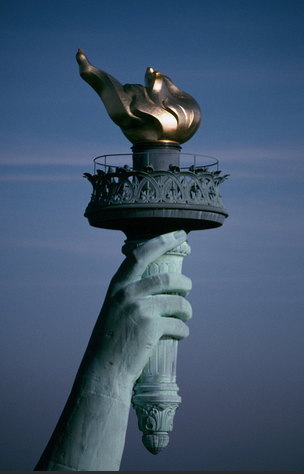We didn’t start the fireworks…
Many of you remember Billy Joel’s pulse-pounding, rap-like recitation of notable events and people from the late 1940s to 1989. In just under five minutes Joel whisks us from Harry Truman and Doris Day to the Tiananmen Square protests and cola wars marketing gambit. His rapid-fire lyrics represent a secular litany of names, titles and slogans that grabbed headlines during his Baby Boomer life. It is a ten-stanza, name-dropping romp through once-current events, interrupted five times by this repetitious refrain:
We didn’t start the fire, it was always burning since the world’s been turning;
We didn’t start the fire, No we didn’t light it but we tried to fight it.
Sharing a similar timeline as the composer, I smile when recalling so many of his references, nearly all of them ringing a bell in my own memory. The song keeps you playing catch-up as he races by so many historical milestones and flashes-in-the-pan that have become fixed in, or disappeared from our cultural memory. And to think his 118 allusions only scratch the surface of important characters and moments during these four significant decades of the twentieth-century.
But what was this fire that the composer so relentlessly described? Was it the fire of progress, of human struggle, or the very energy of existence itself? Maybe he had all of these in mind, and possibly more. The flames of discovery, conflict, achievement and upheaval have been simmering since humans took center stage on this planet so many eons ago. None of us can claim credit for having lit the spark of creativity or set in motion the trajectory of human development, whether that has set us on a progressive, regressive or undulating arc. Yet all of us have been caught up in its inertia. Some of us try to stay ahead of it, some prefer to ride it out, and others resist and fight it, as perhaps Joel was intimating.
Whatever he meant by the fire that he repeats 16 times before song fadeout, his phrase captures for me the essence of what we are celebrating on this day of fire-works and national remembrance. I doubt the authors of the Declaration of Independence could foresee where their protest would go or how long it would endure. Yet they knew they weren’t starting a fire of revolution from scratch as much as they were stoking embers first ignited by the Magna Charta of 1215, then stirred by the political philosophies of John Locke and Thomas Hobbes, further fanned by the Common Sense of Thomas Paine, and, in their hands, kindled by their uncommon commitment to sacrifice, fight and die to bring about its consummation.
In the 245 years since Jefferson, Adams, Franklin, Sherman and Livingston presented their Declaration to the Second Continental Congress for endorsement, a nation came to life that has been forged in and tested by the fire they helped to fuel. Like the fabled box Pandora once dared open, the democratic republic that our founders boldly conceived unleashed a spirit of liberty and justice that could not be confined to one time, one place or even to their own original conception of citizenry defined by property, gender and race. Were their motivations as pure and enlightened as we might want them to be? Likely not. But should that prevent us from treasuring their courage, their vision, and their commitment to the America that we now enjoy and for which they pledged “their lives, their fortunes and their honor”?
Fires, once set, are often difficult to manage, contain or extinguish. Not surprisingly our nation’s history since that inflammatory decade of the 1770s has resembled a conflagration of controlled and uncontrolled burnings, touching every aspect of our national character. And now, after two and a half centuries, the flames of freedom and equality for all touch us in every place and condition in which we live, consuming not only our political and economic preoccupations, but engulfing every relationship we share with other Americans. We didn’t start the fire, but our individual and communal identities--ethnically, religiously, sexually, and racially—are both liberated and constrained by its spread.
The Fourth of July, this year and every year, is never a celebration of a fait accompli somehow pulled off by our predecessors whom we may revere or vilify. It is, instead, a recognition of the part they played in unleashing the flames of liberty and self-governance that had been smoldering under the suffocating weight of monarchs and tyrants. The spectacle of our fireworks today is more than a midsummer night’s entertainment. It is, in ways both subtle and profound, our symbolic rededication to keeping alive that fire of freedom bequeathed to us by founders who hoped we would lovingly tend and ardently defend it.
In commemoration of this Independence Day 2021, and in recognition of the fire in which each of us has been refined as citizens in this unique nation, I’d like to amend Billy Joel’s refrain in this way:
We didn’t start the fire, in it’s light we’ve striven, by its flame we’re driven,
We didn’t start the fire, but we’ll keep it burning while the world keeps turning.
May the spirit of those who willed us into being in 1776, that sparked and channeled freedom’s blaze into a combustible force that forged colonies into a nation, burn brightly in each of us who share in and claim their American dream as our own.
O God we offer You our thanks for America:
…for pilgrim feet, who a thoroughfare for freedom beat;
…for heroes proved in liberating strife;
…for patriot dream that sees beyond the years;
America! America! May God thy gold refine--
Till all success be nobleness, And ev'ry gain divine.
Adapted from Katherine Lee Bates’ poem, “America the Beautiful” (1895)


